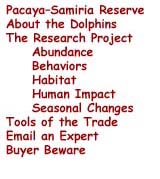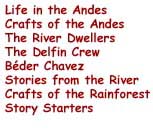

|
Tuesday, November 21, 2000 Puesto Vigilancia 4 -- Ranger Station 4 Since no one on the boat has ever been this far up the river, we weren't sure of the distance between Ranger Stations 3 and 4. We were surprised when the station was spotted around a bend in the river just after noon. Before lunch we had time to explore the station and found it to be the most well-maintained of all the stations so far. There are three buildings; the main station, a shed, and a guesthouse that is used for storage. The two rangers and one volunteer ranger spend a lot of time keeping their surroundings tidy. Inside the station one of the rangers had painted a mural of local animals on the wall. Outside in the dirt there were the initials RNPS, or Reserva Nacional Pacaya-Samiria, planted with grass.
Waldir he pooped all over Enzo when Enzo held him, because he was so scared. We called Enzo “Monkey Boy” as he was the only one by whom Waldir wanted to be held. This morning Waldir was much more relaxed and cuddled up in Shelly’s arms to rest. At first he was a bit resistant and pushed away with his hands, but then he settled down, crossed his arms and rested his head on top of his hands. Shelly could feel Waldir’s heart beating as he relaxed and began to snuggle. He even started to lick her fingers. Waldir clearly wanted to cuddle next to a warm body. When we left, he was curled up in the corner, trying to sleep. He had wrapped one arm around his head, hugging itself. We decided to make him a bed and maybe even a sock doll he can cuddle for comfort. Monkeys are generally very social animals. If Waldir were with his mother, he would rarely leave her arms until he was older. We will drop off the bed and doll on our way back down the river. Shelly is really excited that she will see Waldir again one more time.
This station has the most turtles of any station we have seen so far. Geoff called it the "Taj Mahal" for turtles. There were buckets full of both species just waiting for the water level to rise so that the rangers can set them free. The last time they released a group of turtles the water level was too low and birds ate the turtles before they had a chance to hide. This time the rangers are wiser and will wait. While we were in the station there was a constant, "tap, tap, tap" like the sound of typing on a keyboard. The hundreds and hundreds of turtles continually moved their flippers against each other and the sides of the buckets creating the background noise. Amazingly, all of them were facing toward the direction of the river—with only one thought in mind. Get to the river! Visiting the ranger stations again reminds us of how careful we all need to be when purchasing exotic pets. It is important to know where these animals come from and if they were captured from the wild.While it can be wonderful to have a pet monkey or a tropical bird or fish—sometimes the story behind how that pet got from its home to the pet store is tragic. This is probably one of the easiest ways to make a difference in the lives of rainforest animals. When you go to buy a pet, be sure to ask the pet storeowner or manager where the pet came from before you decide to take it home. It's not a bad idea to ask to see documentation that the animal was not captured from the wild and an ethical breeder raised that it. For more information, read Buyer Beware on our site. In the afternoon we swam in the river off the rangers' dock. The river is so narrow we could have swam across, but no one tried. We are a bit nervous of what could be on the opposite bank and the strength of the current. While Tamara, Shelly, Susan and the captain went exploring the area in the skiff, the men joined the three rangers in two games of football—which Americans call soccer. The team with Geoff, Enzo, Horacio and Letser won both games. It seems that Horacio and Letser are the star players from our boat. Meanwhile, Tracy took some time to relax since she was the only person left on the boat! When the skiff came back, the captain was disappointed to have missed the games. Tamara strongly suggested that all the very sweaty soccer players take showers!
Tamara told the volunteer that he would have to bring his own supply of fresh water to drink, as we have only enough for our needs. She asked him what they do at the station to purify water. He told her that the ranger stations used to be supplied with water purification tablets but aren't any longer. Now they boil all their water. We left the volunteer with a large water bottle in which to bring his supply of water. He has a day and half to boil all the water he will need for the three-day trip with us back to Iquitos. When Tamara told the volunteer that he didn't need to bring his own food, he smiled broadly. His diet is mostly fish and rice at the station. No doubt, he smelled the wonderful aromas coming from Horacio's galley last night. This morning when we woke up there was blood under the captain’s bed. The captain tried to spin a tall tale of how he had caught the rat and killed it himself. The truth is that Machina caught the rat—eating half of it and leaving him a little gift. Yesterday it had been decided to only feed Machina breakfast and lunch in the hopes that she would be just a tad bit hungry in the evening. This plan did the trick. We no longer will be awakened in the night to the sounds of chewing in the kitchen. Machina has joined us up on deck this morning for the first time. She clearly is feeling proud of herself. Up until now, she has spent her time hiding below, only coming out at mealtimes. Based on information from the rangers at Station 4, the captain estimates that it will take us close to seven hours to reach Station 5 today. It will be a long day, but the good thing is that when we are moving there are fewer insects. We are currently heading up-river, counting dolphins while drinking our morning tea. Machina is sitting on Susan's lap, purring. We are the perfect picture of high culture—until one of us slaps her leg to kill yet another biting fly and mumbles something "undistinguishable" under her breath. |




